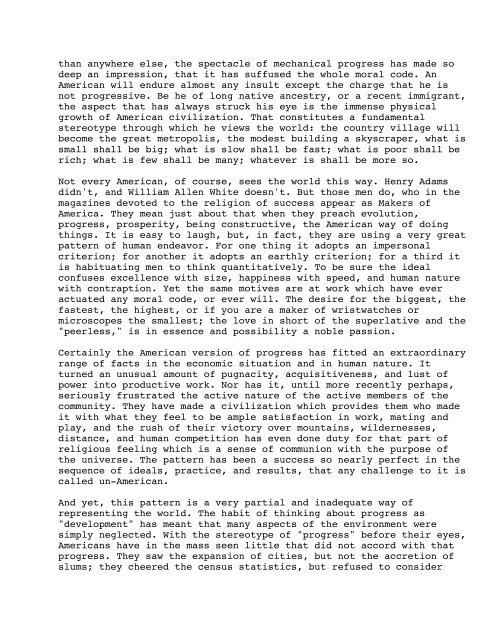PUBLIC OPINION by WALTER LIPPMANN TO FAYE LIPPMANN ...
PUBLIC OPINION by WALTER LIPPMANN TO FAYE LIPPMANN ...
PUBLIC OPINION by WALTER LIPPMANN TO FAYE LIPPMANN ...
Create successful ePaper yourself
Turn your PDF publications into a flip-book with our unique Google optimized e-Paper software.
than anywhere else, the spectacle of mechanical progress has made so<br />
deep an impression, that it has suffused the whole moral code. An<br />
American will endure almost any insult except the charge that he is<br />
not progressive. Be he of long native ancestry, or a recent immigrant,<br />
the aspect that has always struck his eye is the immense physical<br />
growth of American civilization. That constitutes a fundamental<br />
stereotype through which he views the world: the country village will<br />
become the great metropolis, the modest building a skyscraper, what is<br />
small shall be big; what is slow shall be fast; what is poor shall be<br />
rich; what is few shall be many; whatever is shall be more so.<br />
Not every American, of course, sees the world this way. Henry Adams<br />
didn't, and William Allen White doesn't. But those men do, who in the<br />
magazines devoted to the religion of success appear as Makers of<br />
America. They mean just about that when they preach evolution,<br />
progress, prosperity, being constructive, the American way of doing<br />
things. It is easy to laugh, but, in fact, they are using a very great<br />
pattern of human endeavor. For one thing it adopts an impersonal<br />
criterion; for another it adopts an earthly criterion; for a third it<br />
is habituating men to think quantitatively. To be sure the ideal<br />
confuses excellence with size, happiness with speed, and human nature<br />
with contraption. Yet the same motives are at work which have ever<br />
actuated any moral code, or ever will. The desire for the biggest, the<br />
fastest, the highest, or if you are a maker of wristwatches or<br />
microscopes the smallest; the love in short of the superlative and the<br />
"peerless," is in essence and possibility a noble passion.<br />
Certainly the American version of progress has fitted an extraordinary<br />
range of facts in the economic situation and in human nature. It<br />
turned an unusual amount of pugnacity, acquisitiveness, and lust of<br />
power into productive work. Nor has it, until more recently perhaps,<br />
seriously frustrated the active nature of the active members of the<br />
community. They have made a civilization which provides them who made<br />
it with what they feel to be ample satisfaction in work, mating and<br />
play, and the rush of their victory over mountains, wildernesses,<br />
distance, and human competition has even done duty for that part of<br />
religious feeling which is a sense of communion with the purpose of<br />
the universe. The pattern has been a success so nearly perfect in the<br />
sequence of ideals, practice, and results, that any challenge to it is<br />
called un-American.<br />
And yet, this pattern is a very partial and inadequate way of<br />
representing the world. The habit of thinking about progress as<br />
"development" has meant that many aspects of the environment were<br />
simply neglected. With the stereotype of "progress" before their eyes,<br />
Americans have in the mass seen little that did not accord with that<br />
progress. They saw the expansion of cities, but not the accretion of<br />
slums; they cheered the census statistics, but refused to consider





